
Paolo Gentiloni Silveri is an Italian politician who has served as European Commissioner for Economy in the von der Leyen Commission since 1 December 2019. He previously served as prime minister of Italy from December 2016 to June 2018.

Matteo Renzi is an Italian politician who served as prime minister of Italy from 2014 to 2016. He has been a senator for Florence since 2018. Renzi has served as the leader of Italia Viva (IV) since 2019, having been the secretary of the Democratic Party (PD) from 2013 to 2018, with a brief interruption in 2017.

The 2018 Italian general election was held on 4 March 2018 after the Italian Parliament was dissolved by President Sergio Mattarella on 28 December 2017. Voters were electing the 630 members of the Chamber of Deputies and the 315 elective members of the Senate of the Republic for the 18th legislature of the Italian Republic since 1948. The election took place concurrently with the Lombard and Lazio regional elections. No party or coalition gained an absolute majority in the parliament, even though the centre-right coalition won a plurality of seats as a coalition, and the Five Star Movement (M5S) won a plurality of seats as an individual party.

The Italian electoral law of 2015, also known as Italicum, was an Italian electoral law passed in 2015. The law, which came into force on 1 July 2016, regulated only the election of the Chamber of Deputies, replacing the Italian electoral law of 2005, which had been ruled partly unconstitutional by the Constitutional Court of Italy in December 2013. It provided for a two-round system based on party-list proportional representation, including a majority bonus and a 3% election threshold. Candidates would have run in 100 multi-member constituencies using open lists. The largest party which won over 40% of the vote would automatically win a majority of seats; if no party won 40% of seats, a second round of voting would be held between the two largest parties, with the winner of the second round winning a majority of seats. The name "Italicum" was coined in 2014 by Democratic Party secretary and later Prime Minister of Italy, Matteo Renzi, who was one of the legislation's main proponent.
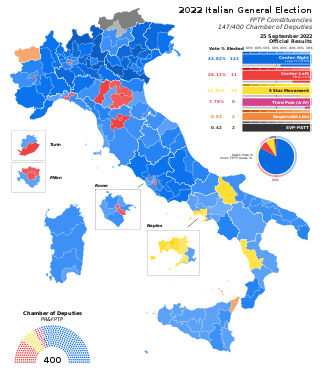
The 2022 Italian general election was a snap election held in Italy on 25 September 2022. After the fall of the Draghi government, which led to a parliamentary impasse, President Sergio Mattarella dissolved Parliament on 21 July, and called for new elections. Regional elections in Sicily were held on the same day. The results of the general election showed the centre-right coalition led by Giorgia Meloni's Brothers of Italy, a radical-right political party with neo-fascist roots, winning an absolute majority of seats in the Italian Parliament. Meloni was appointed Prime Minister of Italy on 22 October, becoming the first woman to hold the office.

The Italian electoral law of 2017, colloquially known by the nickname Rosatellum bis or simply Rosatellum after Ettore Rosato, the Democratic Party (PD) leader in the Chamber of Deputies who first proposed the new law, is a parallel voting system, which acts as a mixed electoral system, with 37% of seats allocated using a first-past-the-post electoral system and 63% using a proportional method, with one round of voting. The Chamber and Senate of the Republic did not differ in the way they allocated the proportional seats, both using the largest remainder method of allocating seats.
Action is a liberal political party in Italy. Its leader is Carlo Calenda, a member of the European Parliament within the group of Renew Europe and former minister of Economic Development.

Italia Viva is a liberal political party in Italy founded in September 2019. The party is led by Matteo Renzi, a former Prime Minister of Italy and former secretary of the Democratic Party (PD). As of 2021, Italia Viva is a member of the European Democratic Party.

Apulia is one of the 29 constituencies represented in the Chamber of Deputies, the lower house of the Italian parliament. The constituency currently elects 43 deputies, being the second largest after Emilia-Romagna. Its boundaries correspond to those of the Italian region of Apulia. The electoral system uses a parallel voting system, which act as a mixed system, with 37% of seats allocated using a first-past-the-post electoral system and 61% using a proportional method, with one round of voting.

Calabria is one of the 29 constituencies represented in the Chamber of Deputies, the lower house of the Italian parliament. The constituency currently elects 21 deputies. Its boundaries correspond to those of the Italian region of Calabria. The electoral system uses a parallel voting system, which act as a mixed system, with 37% of seats allocated using a first-past-the-post electoral system and 61% using a proportional method, with one round of voting.
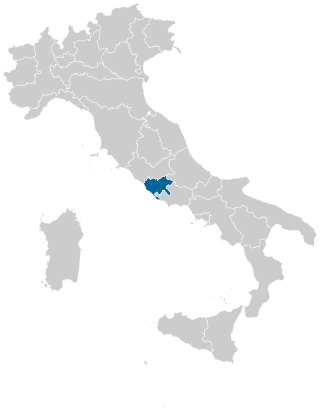
Lazio 1 is one of the 29 constituencies represented in the Chamber of Deputies, the lower house of the Italian parliament. The constituency currently elects 39 deputies. Its boundaries correspond to those of the Metropolitan City of Rome, within the Lazio region. The electoral system uses a parallel voting system, which act as a mixed system, with 37% of seats allocated using a first-past-the-post electoral system and 61% using a proportional method, with one round of voting.
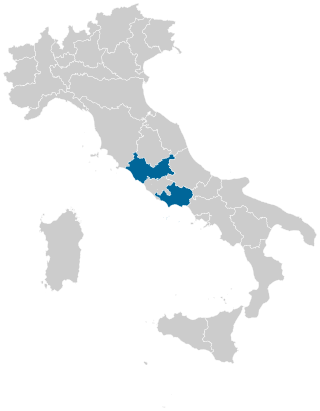
Lazio 2 is one of the 29 constituencies represented in the Chamber of Deputies, the lower house of the Italian parliament. The constituency currently elects 20 deputies. Its boundaries correspond to those of the provinces of Frosinone, Latina, Rieti and Viterbo, within the Lazio region. The electoral system uses a parallel voting system, which act as a mixed system, with 37% of seats allocated using a first-past-the-post electoral system and 61% using a proportional method, with one round of voting.
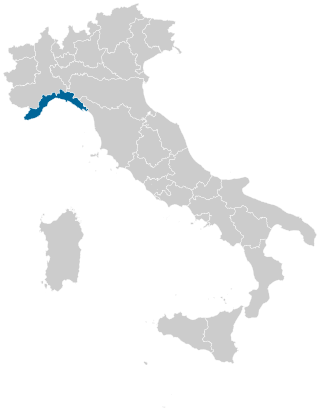
Liguria is one of the 29 constituencies represented in the Chamber of Deputies, the lower house of the Italian parliament. The constituency currently elects 16 deputies. Its boundaries correspond to those of the Italian region of Liguria. The electoral system uses a parallel voting system, which act as a mixed system, with 37% of seats allocated using a first-past-the-post electoral system and 61% using a proportional method, with one round of voting.

Lombardy 1 is one of the 29 constituencies represented in the Chamber of Deputies, the lower house of the Italian parliament. The constituency currently elects 40 deputies. Its boundaries correspond to those of the Metropolitan City of Milan and the Province of Monza and Brianza, within the Lombardy region. The electoral system uses a parallel voting system, which act as a mixed system, with 37% of seats allocated using a first-past-the-post electoral system and 61% using a proportional method, with one round of voting.
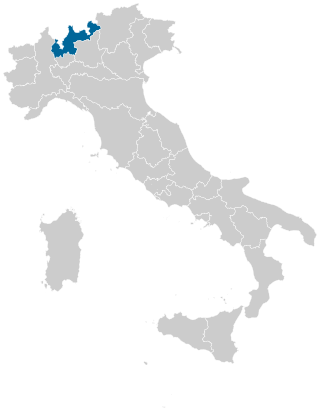
Lombardy 2 is one of the 29 constituencies represented in the Chamber of Deputies, the lower house of the Italian parliament. The constituency currently elects 22 deputies. Its boundaries correspond to those of the provinces of Como, Lecco, Sondrio and Varese, within the Lombardy region. The electoral system uses a parallel voting system, which act as a mixed system, with 37% of seats allocated using a first-past-the-post electoral system and 61% using a proportional method, with one round of voting.

Lombardy 3 is one of the 29 constituencies represented in the Chamber of Deputies, the lower house of the Italian parliament. The constituency originally elected 23 deputies, while since 2022, following the constitutional referendum which reduced the number of seats in parliament, it elects 14 deputies. Its boundaries correspond to those of the provinces of Bergamo and Brescia, within the Lombardy region. The electoral system uses a parallel voting system, which act as a mixed system, with 37% of seats allocated using a first-past-the-post electoral system and 61% using a proportional method, with one round of voting.

Lombardy 4 is one of the 29 constituencies represented in the Chamber of Deputies, the lower house of the Italian parliament. The constituency currently elects 17 deputies. Its boundaries correspond to those of the provinces of Cremona, Lodi, Mantua and Pavia, within the Lombardy region. The electoral system uses a parallel voting system, which act as a mixed system, with 37% of seats allocated using a first-past-the-post electoral system and 61% using a proportional method, with one round of voting.
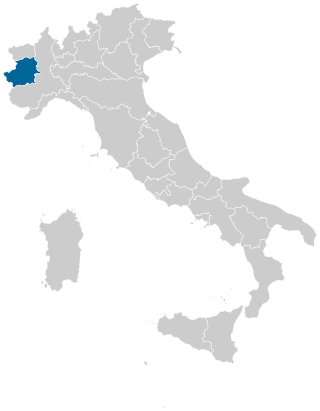
Piedmont 1 is one of the 29 constituencies represented in the Chamber of Deputies, the lower house of the Italian parliament. The constituency currently elects 25 deputies. Its boundaries correspond to those of the Metropolitan City of Turin, within the Piedmont region. The electoral system uses a parallel voting system, which act as a mixed system, with 37% of seats allocated using a first-past-the-post electoral system and 61% using a proportional method, with one round of voting.

Sardinia is one of the 29 constituencies represented in the Chamber of Deputies, the lower house of the Italian parliament. The constituency currently elects 17 deputies. Its boundaries correspond to those of the Italian region of Sardinia. The electoral system uses a parallel voting system, which act as a mixed system, with 37% of seats allocated using a first-past-the-post electoral system and 61% using a proportional method, with one round of voting.

Umbria is one of the 29 constituencies represented in the Chamber of Deputies, the lower house of the Italian parliament. The constituency currently elects 9 deputies. Its boundaries correspond to those of the Italian region of Umbria. The electoral system uses a parallel voting system, which act as a mixed system, with 37% of seats allocated using a first-past-the-post electoral system and 61% using a proportional method, with one round of voting.


















